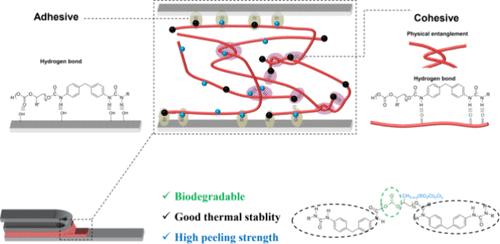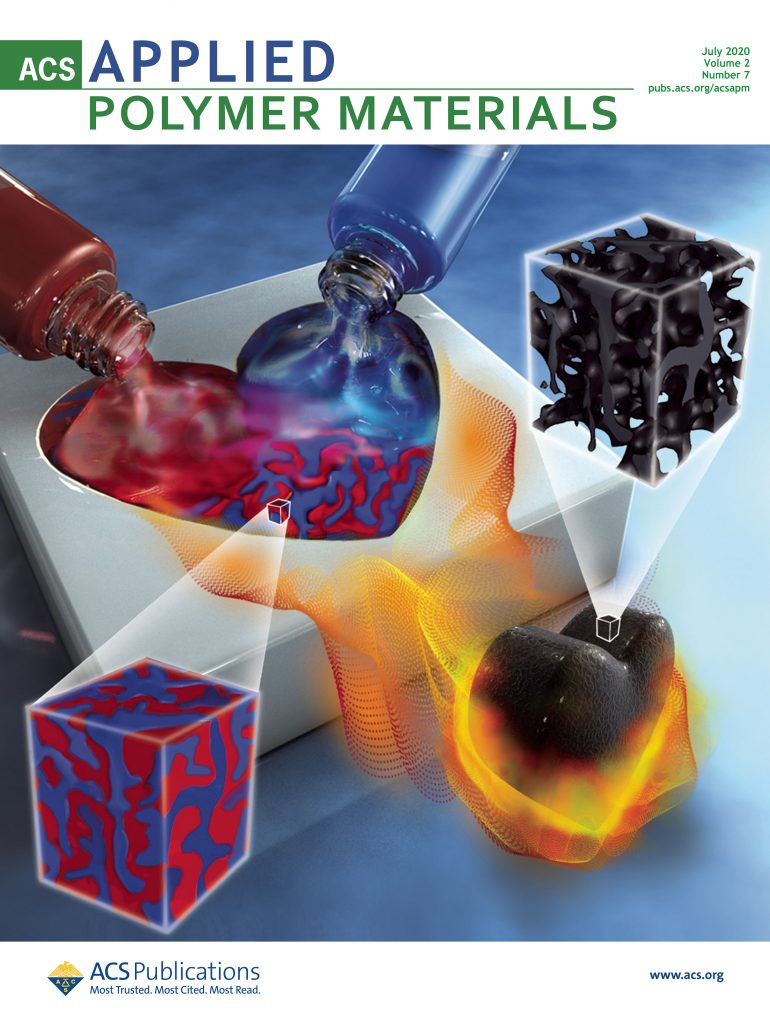具有更好热稳定性和剥离强度的氯磺化聚丙烯碳酸酯基压敏粘合剂
IF 4.7
2区 化学
Q2 MATERIALS SCIENCE, MULTIDISCIPLINARY
引用次数: 0
摘要
压敏粘合剂(PSA)面临的挑战是开发热稳定性高、剥离强度大的可生物降解的压敏粘合剂。为了克服这一缺点,我们采用无溶剂方法设计并合成了一系列 4,4′-二苯基甲烷二异氰酸酯(MDI)改性氯磺化聚(碳酸丙烯酯)(CSPPC-MDIs)。我们发现,引入 MDI 能有效提高分子量、Tg 和热稳定性,这表明 MDI 既是封端试剂,又是扩链剂。流变曲线、粘性测试和剥离测试结果表明,与原始 CSPPC 相比,CSPPC-MDI 具有更高的粘合性能和剥离强度。此外,CSPPC-MDI 的粘合性和内聚性可通过调整 MDI 进料比来控制。与 3M 810、3M 2929 和 AveryDennison 5078A 等商用 PSAs 相比,CSPPC-MDI-3.0(CSPPC 和 3 wt % MDI 的反应产物)具有更高的剥离强度(9.1 ± 0.1 N/cm)和可生物降解特性,这表明 CSPPC-MDIs 未来可作为高性能 PSAs 的更佳候选材料。本文章由计算机程序翻译,如有差异,请以英文原文为准。

Chlorosulfonated Poly(propylene carbonate)-Based Pressure-Sensitive Adhesives with Improved Thermal Stability and Peel Strength
The challenge of pressure-sensitive adhesives (PSAs) is to develop biodegradable PSAs with prominent thermal stability and considerable peel strength. To overcome this drawback, we designed and synthesized a series of 4,4′-diphenylmethane diisocyanate (MDI)-modified chlorosulfonated poly(propylene carbonate)s (CSPPC-MDIs) using a solvent-free method. We found that the introduction of MDI can effectively increase the molecular weight, Tg, and thermal stability, demonstrating that MDI acts as both a capping reagent and chain extender. Rheology profiles, tack test and peel test results demonstrate that CSPPC-MDIs exhibit higher adhesion properties and peel strengths than original CSPPC. Furthermore, the adhesive and cohesive properties of CSPPC-MDIs can be controlled by tuning the MDI feed ratios. The CSPPC-MDI-3.0 (the reaction product of CSPPC and 3 wt % MDI) has a prominent peel strength (9.1 ± 0.1 N/cm) and biodegradable features compared to commercial PSAs such as 3M 810, 3M 2929, and AveryDennison 5078A, indicating that CSPPC-MDIs can be used as a better candidate for high-performance PSAs in the future.
求助全文
通过发布文献求助,成功后即可免费获取论文全文。
去求助
来源期刊

ACS Applied Polymer Materials
Multiple-
CiteScore
7.20
自引率
6.00%
发文量
810
期刊介绍:
ACS Applied Polymer Materials is an interdisciplinary journal publishing original research covering all aspects of engineering, chemistry, physics, and biology relevant to applications of polymers.
The journal is devoted to reports of new and original experimental and theoretical research of an applied nature that integrates fundamental knowledge in the areas of materials, engineering, physics, bioscience, polymer science and chemistry into important polymer applications. The journal is specifically interested in work that addresses relationships among structure, processing, morphology, chemistry, properties, and function as well as work that provide insights into mechanisms critical to the performance of the polymer for applications.
 求助内容:
求助内容: 应助结果提醒方式:
应助结果提醒方式:


